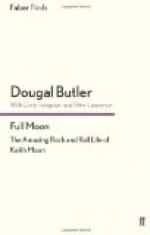“You seem to know a lot about old clocks.”
Mr. Brimsdown, astride his favourite hobby, rode it irresistibly. He discoursed of clocks and their makers, and Barrant listened in silence. The subject was not without its fascination for him, because it suggested a strange train of thought about the hood clock which was the text, as it were, of the lawyer’s discourse. He looked up. Mr. Brimsdown, in front of the clock, was discoursing about dials and pendulums. Barrant broke in abruptly with the question on his mind—
“Can you, with your knowledge of old clocks, suggest any reason which would cause Robert Turold to go to it? Are the works intricate? Would such a clock require much adjustment?”
“Robert Turold was not likely to think of adjusting a clock in his dying moments,” returned Mr. Brimsdown, with a glance which betokened that he perfectly understood his companion had some other reason for his question.
“There’s a smear of blood on the dial,” said Barrant, staring at it.
“Was that made by the right or left hand?”
“The right hand was resting on the clock-face. Why do you ask?”
Mr. Brimsdown hesitated, then said: “The thought has occurred to me that Robert Turold may have gone to the clock for a different purpose—not for papers. Perhaps his last thought was to indicate the name of the murderer on the white face of the clock.”
“In his blood? Rather a melodramatic idea, that! He had writing materials before him if he wanted to do that, if he thought of it. He was shot down in the act of writing, remember.”
A silence fell between them on this declaration—a silence terminated by Barrant remarking that it was really late, and he must be getting back to Penzance. Mr. Brimsdown made no suggestion to accompany him. Instead he rustled papers in Robert Turold’s cabinet as though to convey the impression that the sorting and searching of them would take him some time. Barrant, from whose eyes speculation and suspicion looked out from a depth, like the remote glance of a spider which had scurried to a hole, gave a slight sign of farewell, and wheeled out of the apartment without another word.
Downstairs he went, plunged in the deepest thought. Looking downward, he saw Thalassa escorting Dr. Ravenshaw to the front door. The doctor’s voice reached him.
“... She must not be left alone on any account—understand that. You ought to get somebody to look after her.”
“I can’t afford nobody,” Thalassa made reply.
Dr. Ravenshaw was about to say something more, but the figure of the descending detective caught his eye. Barrant made a detaining gesture, and the doctor waited in the passage for him. Barrant, with a slight glance at the motionless figure of Thalassa, led the way into the front room. He closed the door before he spoke.
“Doctor,” he said, “have you told anybody about those marks on Robert Turold’s arm?”




